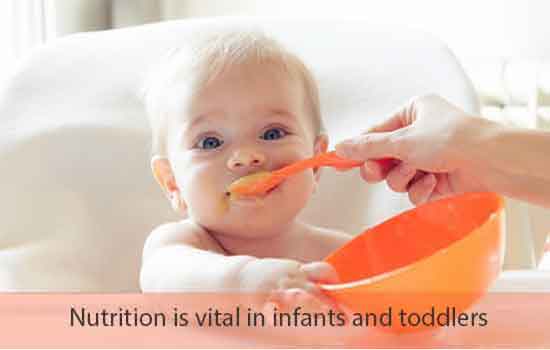nutrition
Why nutrition is vital in infants and toddlers
By Forever Expert

2023-04-04
Vital nutrition for infants

Nutrition plays an important role in healthy growth and development during the early years of life. Nutritional needs at different ages and in different stages of life vary with age, sex, and health status, and activity level. Development during infancy is fast. During this period, the necessities for vitality and nutrients are most elevated relative to body measure when compared with other growth periods. Moreover, this period is basic for neurocognitive development.
Illness is related to delayed mental and motor development that can even have enduring adverse effects beyond childhood.
It occurs due to a lack of the right amounts of macronutrients like protein, fat, and carbohydrates and micronutrients like vitamin A, iodine, iron, and zinc. Great nutrition during the primary 2 years of life is crucial for healthy development and improvement. Beginning great nourishment practices early can help children create healthy dietary designs. This site brings together existing data and viable methodologies on bolstering healthy nourishments and drinks to infants and little children, from birth to 24 months of age.
NUTRITIONAL NEED OF BABIES FROM 0-6 MONTHS:-

Breastmilk is a natural food for babies. It is safe, inexpensive, and provides all of the nutrients babies need for the first 6 months of life. It has the very important added advantage of increasing the baby’s resistance to disease, as the mother can pass her immune factors for certain diseases through her milk to protect her baby.
This ability of breastmilk to protect against many diseases is an important reason that breastmilk is so healthy for babies. babies depend on their mother’s milk during the first six months of life. While their digestive and immune systems are developing and maturing.
Cow, goat, or any other animal milk to a baby under one year of age is not an adequate replacement for breastmilk, as the nutrients in those milk are those needed to support the growth of a baby cow or goat and are different from the nutrients needed by a human baby.
HOW IT WORKS:-
Colostrum, the first milk right after birth, is an essential food for newborn babies. It contains high levels of vitamin A and substances that protect newborns from infections and disease. Babies who are breastfed have many health advantages over babies fed other kinds of milk. Mother’s milk contains the perfect amount of protein, fat, carbohydrate, and other nutrients for the new baby’s growth and development.
NUTRITIONAL NEED OF BABIES FROM 6–24 MONTHS:-

Breastmilk is the basic food of the young baby, milk alone is not enough to meet increased nutritional needs as the baby grows older. Because young children continue to grow very fast and may still have immature digestive and immune systems. Continued breastfeeding is recommended until they are 18 months to two years of age along with other foods. By six months, babies need to start to eat other foods, called “complementary foods”. As they complement the breastmilk, to meet their needs for energy, protein, vitamins, and minerals.
Babies and young children 6–24 months old have very high energy and nutrient needs for their body size and are often at risk of being malnourished. Adequate care and feeding are essential for their normal growth, development, health, and activity. Frequent feeding (4–5 times a day) with appropriate foods with breastmilk, ensures that young children get sufficient energy and nutrients to grow normally and stay healthy.
Calories, protein, and iron are especially important to meet the demands of the baby’s rapid growth. To meet all of the baby’s nutritional needs, foods high in energy and other nutrients, such as oil, fruit, vegetables, legumes, and animal products should be included in the baby’s diet. Firstly, the baby is accustomed to liquid and soft foods.
As teeth appear, semi-solid and then solid foods are added to their diet. New foods should be introduced to the child one at a time.
This allows the child to get used to the food before another new food is introduced to their diet. Good complementary foods to start first include soft meat, vegetables, and fruits mashed to thin consistency to prevent the baby from choking. Foods should be prepared without added salt.
Starchy foods alone are not the best first foods for babies because they do not provide enough protein, calories and other nutrients to meet the needs of the rapidly growing baby.
Too much starchy food can result in malnourishment, illness, and babies will stop growing properly. Starchy staple foods that are part of the local diet can be enriched to make good complementary foods by adding groundnuts, beans, shredded or pounded green leafy vegetables and other vegetables, fatty foods (groundnuts, meat, or fatty fish) with a small amount of oil.
EFFECTS ON PHYSICAL SKILLS:-
- Jumps with both feet.
- Throws the ball overhead.
- Can dress under supervision.
- can use zippers, buckles, and buttons.
EFFECTS ON COGNITIVE SKILLS:-
- Improve the understanding of how to avoid simple obstacles.
NUTRITIONAL NEED OF TODDLERS FROM 2–10 YEARS:-

Children have a high need for energy and nutrients but they have small stomachs. As they cannot eat large portions of food at one time. For this reason, they need to eat foods rich in protein and other nutrients. Although the child is still growing rapidly, the rate of growth is slower than in the first 12 months of life. At the end of the third year of age, girls and boys will have achieved about 50 percent of their adult height. Both girls and boys grow at approximately the same rate until they reach puberty and they need the same amount of food and have the same nutrient needs.
Very active children of either sex may need slightly more food to meet their energy needs than less active children.
They should have three good meals each day and nutritious snacks, at school and home, in between meals. Children need to have a nutritious meal before going to school, especially if they have to walk long distances to get there. Further, a meal and nutrient-rich snacks while at school helps keep up their energy. If schools do not provide meals or snacks, children should take food from home to eat at school. Whether these meals and snacks are provided by the family or by the school, it is important to include a variety of the different foods necessary for children’s nutritional needs.
EFFECTS ON PHYSICAL SKILLS:-
- Most children can stand on one foot for 5 seconds. They can also hop on one foot and can broad-jump as well
- Most children can hop and balance on one foot, can do forward heel-toe walking, and can catch the bounced ball.
- The complex gross and fine motor and perceptual skills are improved through practice and refinement.
EFFECTS ON COGNITIVE SKILLS:-
- Can count up to 3, can tell its age, first and last name can answer simple questions
- Can count 5–10 objects, asks questions, has a vocabulary of more than 200 words, understands the concepts of opposite and consecutive
- Thinking becomes logical and rational, concrete operational thinking is developed.
NUTRITIONAL NEED OF ADULTS FROM 11-17 YEARS:-
The period of adolescence is a time of very rapid growth and high demands for nutrients and energy. The rapid growth period starts at the age of 10 or 11 for girls and the age of 12 or 13 for boys and continues for about 2.5 years. Adolescents need high intakes of calories, vitamins, and minerals, especially iron, calcium, vitamins A, C, and D. Some adolescents, however, become less physically active and have to meet their nutrient needs without eating more calories than they need to maintain healthy body weight. Adolescence is a time to reinforce good food habits and establish regular meal patterns.
Dietary habits and food preferences are developed in childhood and particularly in adolescence.
As they become more independent, many adolescents begin to have more meals away from the family, often resulting in poor food choices, skipped meals, increased snacking instead of regular, balanced meals, and lower vitamin and mineral intake at a time when good nutrition is especially important.
Also, adolescents also tend to follow food fads and slimming diets which do not meet all of their nutritional needs. It is important at this age to eat a variety of foods, including carbohydrates, plentiful fruits and vegetables, daily protein and dairy foods, or other foods containing calcium, and to avoid excess fat and sugar.
EFFECTS ON PHYSICAL SKILLS: –
- Rapid growth and development of sexual organs as well as secondary sex characteristics
EFFECTS ON COGNITIVE SKILLS:-

- Develop formal operational thinking during early adolescence which becomes well developed during the latter part of adolescence.
SUMMARY
Physical effects:-
Lacking nutrition during the earliest stages, childhood or youth can limit development, debilitate resistance, and increase the frequency of contaminations and diseases. Undernutrition can start with conception itself due to maternal undernutrition. Further, this may lead to the conveyance of low birth-weight babies.
In many countries, less than 1percent of preschool children endure severe forms of protein vitality malnutrition (PEM), sub-clinical undernourishment is predominant in nearly half of less than 5-year-old children with side effects such as underweight, hindering, and wasting.
Poor or deficient count calories can moreover cause catabolism of body tissues and disappointment to supply vitality substrate. Ceaseless undernutrition amid childhood a long time leads to brief stature in grown-ups.
Effect on the nervous system: –
The nervous system is most suspected to be affected by nutritional imbalance from birth till 2years of age. Diet performs a dual role in cognitive improvement:-
- It provides energy to the brain for its proper functioning.
- It provides a substrate that helps in brain construction.
Two major impacts on brain function and its structure composition are due to intrauterine and extra-uterine malnutrition. Also, it affects the hippocampus, cerebellum, and neocortex portion the most. This type of malnutrition leads to:-
- Reduction in brain cells
- Less number of synapses
- Arborisation of dendrites
- Myelin production
- Small brain size
- Changes in the neurotransmitter system
Overall it affects
- Delay in cognitive and motor functions
- Lower IQ scores
- Impaired school performance
- Learning disorders
- Poor memory
- Reduced social skills
Hence, a nutritionally balanced diet is crucial for proper growth, development, and boosting of the immune function. Macronutrients like carbohydrates, protein, fats, and micronutrients like calcium, iron, vitamin A, vitamin D.
Here is some recommendation by the researchers:-
Nutrition Requirement: –
- For infants
- (0-6 months) – Calcium (500mg/d), Iron (46mg/d), Net energy (92 kcal/d).
- (6-12 months) – Calcium (500mg/d), Iron (46mg/d),Net energy (80 kcal/d),Vitamin A(Retinol 350,B-carotene 2800)(mg/d)
- For toddlers
- (1-3 years) – Calcium (600mg/d), Iron (9mg/d),Net energy (1060 kcal/d),Vitamin A(Retinol 400,B-carotene 3200)(mg/d)
- (4-6 years) – Calcium (600mg/d), Iron (13mg/d),Net energy (1350 kcal/d),Vitamin A(Retinol 400,B-carotene 3200)(mg/d)
- (7-9 years) – Calcium (600mg/d), Iron (16mg/d),Net energy (1690 kcal/d),Vitamin A(Retinol 600,B-carotene 4800)(mg/d)








